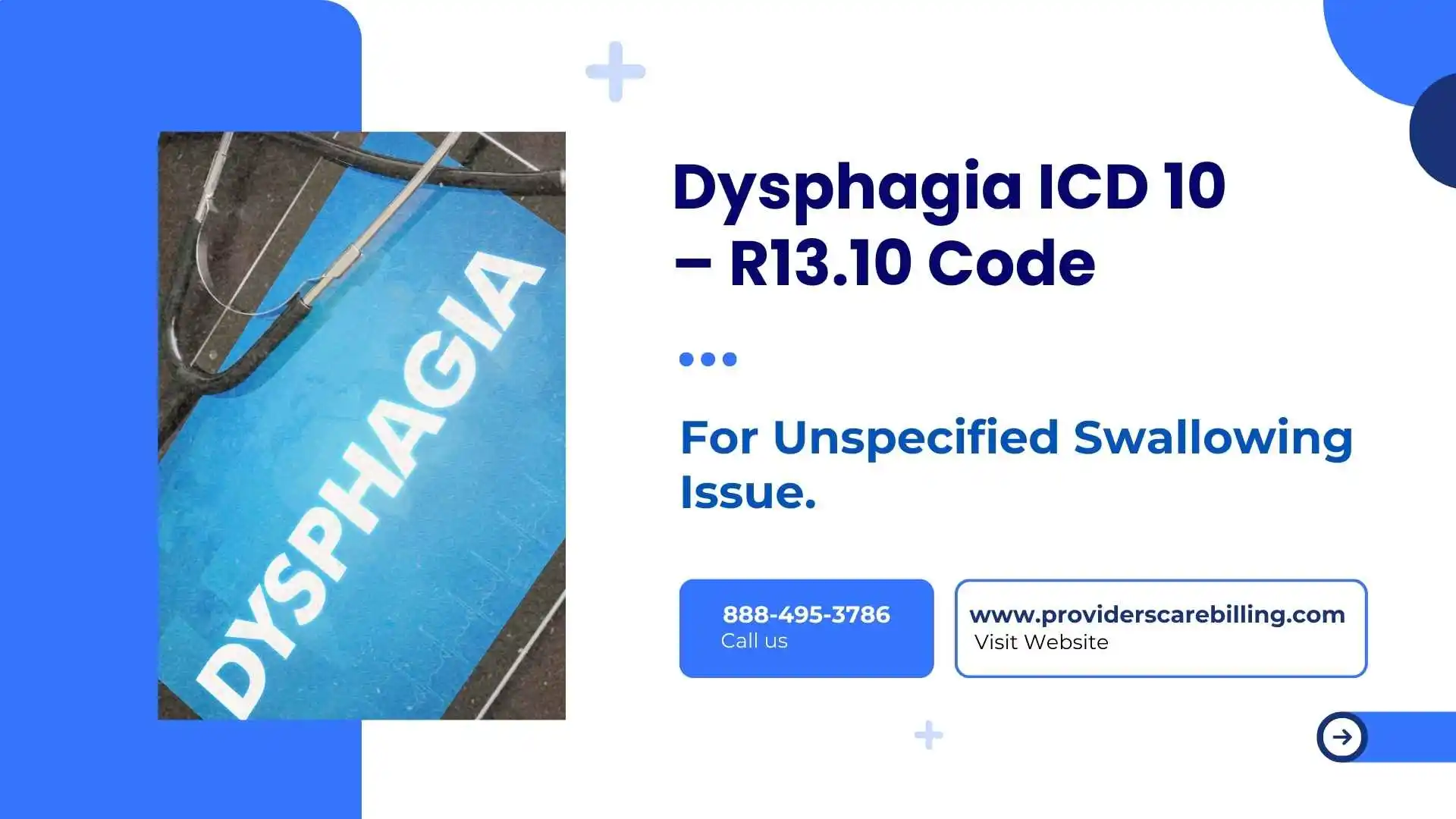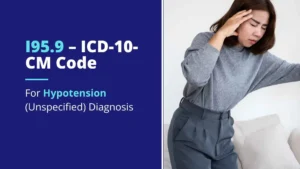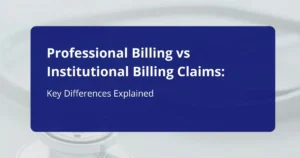As humans, we often overlook basic functions and take them for granted until they go wrong. Swallowing is no different. Many factors cause difficulties in swallowing, which is known as dysphagia. It makes you face several physical problems in life, such as choking, coughing, or, in some cases, facing immense pain.
In this age, you must have heard terms like ICD-10 code for dysphagia or R13.10 about dysphagia. In this article, we will explain what dysphagia ICD-10 is, how to use R13.10, and the use of R13.10 for swallowing disorders.
What is Dysphagia?
In simple terms, dysphagia is the discomfort or difficulty swallowing food or a drink. It occurs with solid food, liquid, or both at times. It can be due to different reasons, like neurological, muscular, psychological factors, and others.
Among all factors, neurological problems in the brain or nerves come on top, like after a stroke, or issues in the food pipe, acid reflux (GERD) happens. The symptoms of dysphagia are cough or choking while eating something, and feeling pain when swallowing. Sometimes, they feel like food is stuck in their throat or chest.
ICD-10 Code for Dysphagia – R13.10
The ICD-10 code for dysphagia is “Dysphagia, unspecified.” This is R13.10, which is used when the exact cause of swallowing trouble is not known yet. As a reminder, R13.10 is a billable code that is documented for reimbursement of difficulty swallowing, before further testing or evaluation.
Key Information About R13.10:
- Description: Dysphagia, unspecified
- Status: Billable
- Use Case: When evaluation confirms dysphagia, but the specific reason is not identified.
When to Use R13.10?
When a patient has a swallowing problem and the physician does not have any idea of why the patient has this problem, then the R13.10 code will be used. It usually takes place in the early steps of diagnosing. Here, further information is needed.
Also, it is common practice to use R13.10 as a preliminary diagnosis when time for further testing is minimal. When more information becomes available, some other ICD-10 codes will replace this code for dysphagia.
Related ICD-10 Codes for Dysphagia
While R13.10 is not a single code used for this purpose. It also has related ICD-10 codes for dysphagia that are more specific, such as:
- R13.11: Dysphagia, oral phase
- R13.12: Dysphagia, oropharyngeal phase
- R13.13: Dysphagia, pharyngeal phase
- R13.14: Dysphagia, pharyngoesophageal phase
- R13.19: Other dysphagia
It is good to use the more specific codes where applicable. R13.10 is best used for starting evaluations, as it remains a generally accepted choice.
Common Search Terms and Synonyms
Like all other ICD-10 codes, this code also has some relevant codes that many medical coders and healthcare professionals search for related to dysphagia in ICD-10. The most common are as follows:
- Dx code for dysphagia
- ICD code dysphagia
- ICD-10 for difficulty swallowing
- Swallowing ICD-10
All these terms have a correlation with R13.10, though the wording is somehow different.
Difference between Odynophagia and Dysphagia ICD-10
Many people mix up dysphagia with odynophagia. No doubt, both are swallowing malfunctions, but they are different.
- In Dysphagia, there is difficulty swallowing food or liquid.
- In Odynophagia, a pain is felt during swallowing that is mostly due to inflammation or irritation in the throat.
The ICD-10 code for odynophagia is different, that is R13.15. If somebody has both pain and difficulty, then both conditions will be coded separately.
Clinical Scenarios That Warrant R13.10
There are specific situations where the use of the ICD-10 code for dysphagia (R13.10) becomes necessary. Some are given below:
- Many stroke patients have dysphagia, and the reason for this condition remains unknown for a long time.
- People with Gastroesophageal Reflux Disease (GERD) sometimes face difficulty in swallowing, though there is no clear physical blockage or oesophageal stricture.
- The older ones also have some difficulty in swallowing, but no obvious reasons are available.
In all these cases, R13.10 provides a way to capture the symptom while additional examinations and evaluations are done to clarify the underlying problem.
Documentation Tips for Accurate Coding
The accuracy of coding and billing is not possible without clear and complete documentation. For precise coding of diagnosis and billing that adheres to the regulations, ensure to document the following:
- When and how dysphagia started
- Related symptoms
- Rule-outs
- Initial management or referrals
Always be precise. Avoid vague terms. In cases of difficulty swallowing, there should be clinical evidence to support the diagnosis, and any ruling out should be appropriately documented.
Additional Variants and Rare Use-Cases
R13.10 may be used alongside or instead of other ICD-10 codes in more specific cases of dysphagia:
- Dysphagia due to Eagle’s syndrome: This is a rare condition in which the stylohyoid ligament enlarges, causing difficulty swallowing.
- ICD-10 code for tricuspid regurgitation: It is not directly related to swallowing; people often confuse chest discomfort from conditions like this with dysphagia.
- ICD-10 for aortic regurgitation: This condition results in chest discomfort, which could be confused with swallowing issues.
- Dysphagia nursing diagnosis: This billing is used for care planning, but not for billing.
These conditions show that dysphagia is more exclusive as a diagnosis rather than a symptom.
Final Words!
In conclusion, when the diagnosis is a problem swallowing, and the cause of the issue is not mentioned, the patient requires the application of the dysphagia (R13.10) ICD-10 code. If you are typing in dysphagia ICD 10, dx code for dysphagia or difficulty swallowing ICD 10 code, the code R13.10 will definitely be used as it is a placeholder for initial visits and symptom evaluation.
Therefore, we say that when correctly utilised and applied, the code R13.10 may lead to trouble-free medical claims and instant remuneration of healthcare providers and medical billing specialists. In this way, it becomes important to receive proper reimbursement.
If you are seeking help with billing or coding for any swallowing disorders, feel free to contact Providers Care Billing LLC. We ensure that billing is not only accurate but also complies with all regulations for dysphagia and other related disorders.
Related: For guidance on another critical diagnosis, see our detailed article on ICD-10 N17.9 for Acute Kidney Injury (AKI).




